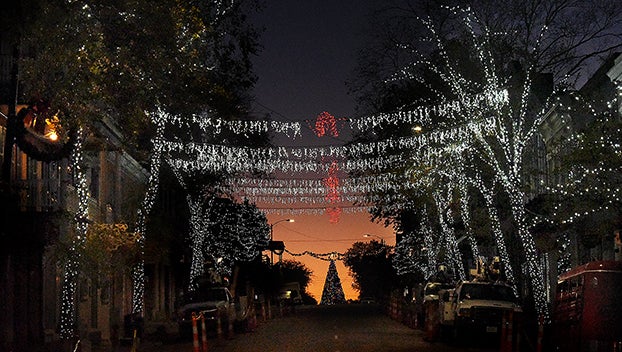History conference speaker says 1965 boycott became model for state
Published 12:04 am Saturday, April 20, 2013

JAY SOWERS | THE NATCHEZ DEMOCRAT — Scholar-activist Akinyele Umoja presents his speech, “The 1965 Natchez Boycott and its Impact on the Mississippi Freedom Movement,” as part of the 2013 Historic Natchez Conference at the Eola Hotel on Friday morning.
NATCHEZ — A model for an effective boycott that was created in Natchez was replicated throughout the state of Mississippi, author, professor and activist Akinyele Umoja told Historic Natchez Conference attendees at his lecture Friday at the Eola Hotel on the boycott and its impact on the state’s freedom movement.

JAY SOWERS | THE NATCHEZ DEMOCRAT — Natchez resident Betty Cade, center, listens as scholar-activist Akinyele Umoja presents his speech “The 1965 Natchez Boycott and its Impact on the Mississippi Freedom Movement” as part of the 2013 Historic Natchez Conference at the Eola Hotel on Friday morning.
The crux of the Natchez model boycott, Umoja said, was the combination of the economic impact of the boycott organized by the NAACP, the armed protection the Natchez Deacons of Justice provided to leadership and members of the black community and the pressure from activists put on blacks who wanted to violate the boycott.
Umoja said the federal government intervened in some instances of Civil Rights uprising and injustices in the 1960s.
He said the country has even witnessed this week the “full-court press” the government has put on to catch the suspects in Monday’s Boston Marathon bombings.
“But the cavalry wasn’t coming (to Natchez) in 1964 and 1965,” Umoja said.
With the economic growth through industries that emerged in Natchez after World War II came population growth, Umoja said.
“With that population and economic growth, another development that increased was the Ku Klux Klan…possibly the highest Klan population anywhere in the South,” he said.
From Feb. 18-20 in 1964, 16 black men were abducted and beaten by the KKK, Umoja said. On Aug. 27, 1965, NAACP President George Metcalfe’s car was bombed at Armstrong Tire Company.
Peaceful protest and nonviolence were the foundation of the NAACP’s freedom movement, Umoja said. But nonviolent activism would not work in Natchez or in other parts of Mississippi, Umoja said echoing the words of activist Charles Evers.
The day after Metcalfe’s car was bombed, the Deacons for Defense and Justice announced their organization, even though the group had been meeting for weeks.
The paramilitary Deacons were different from other armed resistance factions in that they had an actual chain of command, Umoja said.
Umoja said that the Rev. James Stokes, who was spokesman for the Natchez Deacons, said the strongest weapon the Deacons had was the deception of their own numbers.
“The strongest thing we had going for ourselves is that nobody knew, not even some of our members, how many men there were in the organization,” Umoja said, quoting Stokes.
The Deacons presented a list of demands drafted by the NAACP to the City of Natchez in 1965. The demands were initially denied but were met after the boycott hurt white-owned businesses, Umoja said.
But the boycott would not have been as effective, Umoja said, if it were not for the organization of activists by Rudy Shields to ensure blacks did not violate the boycott.
Umoja said he was surprised by that aspect of the Civil Rights movement during his research.
“I didn’t know this until I started doing my research,” he said. “I thought black people supported the movement because we were black, and we stood in solidarity,” he said.
But it took Shields’ organization and enforcement of the boycott to make the local movement successful, Umoja said.
The basic formula of the Deacons’ protection, the boycott and the enforcement of the support of the boycott is one that Shields would take to other parts of the state, Umoja said.
“You need to be proud,” he said. “You created something … that actually changed race relations in this state,” he said.
Bernard thanked Natchez activist Jessie Bernard Williams and others at the conference for their help during his research into the Natchez movement for his book “We Will Shoot Back.”






